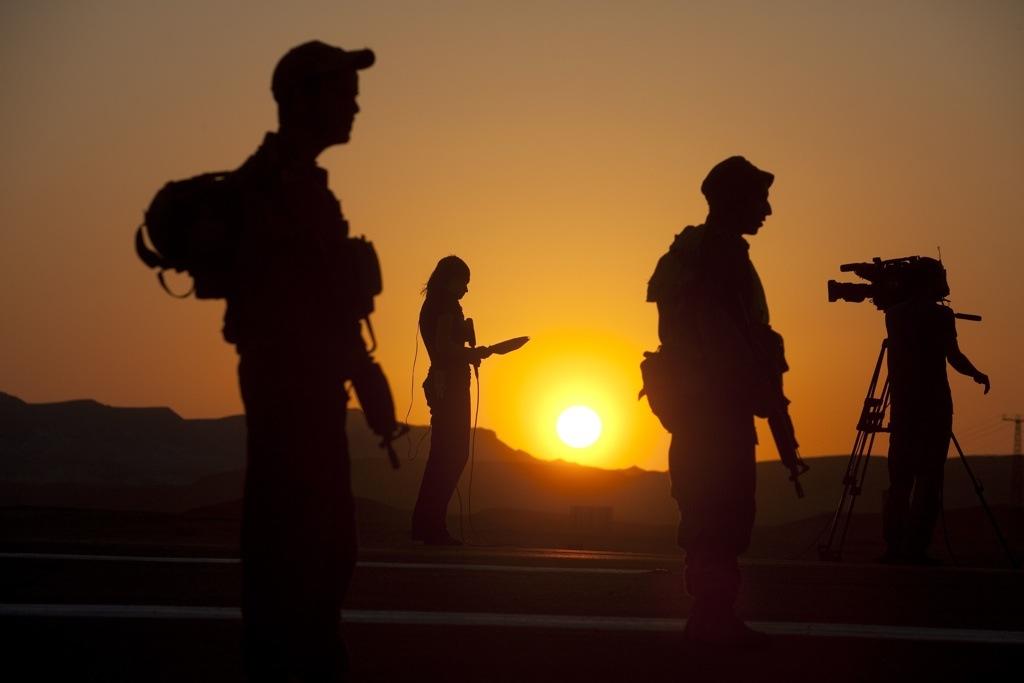Security fears douse Israeli protests
Israeli soldiers stand guard near the coastal city of Eilat on Aug 18, 2011, following a string of deadly attacks in southern Israel.
JERUSALEM, Israel — After two days in which eight Israelis were killed in terror attacks and the south of the country found itself under the barrage of more than 20 missiles, the Israel Air Force retaliated with a series of air strikes against Gaza, killing at least two leaders of the Palestinian Popular Resistance Committee.
Thirty-seven Israelis were wounded in the attacks on Thursday and Friday. Three Egyptian soldiers were also killed in further border skirmishes, though the source of the firing is unclear.
The sudden outbreak of violence along Israel’s border with Egypt and the Gaza strip found the country facing both a familiar routine and a new unknown.
Though no terror group has claimed responsibility for the well-coordinated infiltration, in which, according to Israeli sources, at least 15 terrorists crossed the border into Israel, Prime Minister Benjamin Netanyahu immediately blamed Hamas in Gaza for overall responsibility and announced major retaliatory strikes.
The new outbreak of terror fuels two significant Israeli fears. The first is the possibility of chaos on the southern border. Israelis are anxious that the popular revolution that unseated Egypt’s Hosni Mubarak last February has spawned a lawless colossus, with the increasingly unruly Sinai Peninsula impossible to control.
GlobalPost in Tel Aviv: Israeli protests spread to 18 cities
With Egyptian security forces necessarily focused on keeping the peace in the major urban centers like Cairo and Alexandria, Israelis are concerned that there simply isn’t enough manpower to police the huge, empty desert that is already a haven for smugglers. A pipeline carrying Egyptian crude oil to Israel has been repeatedly sabotaged in recent months.
The second Israeli fear is that the popular demonstrations which have gripped the country for the past month and a half, calling for social reforms aimed at easing the middle class struggle, and bringing with them a welcome sense of non-security related normalcy for hundreds of thousands of Israelis, will fizzle out in the face of a major threat to national security.
“Well, they’re not going to get their million-man march,” said noted political analyst Amnon Abramovich on Friday, referring to huge rallies that had been planned across the country for Sept. 3. “Maybe they’ll get a million man petition.”
Upon hearing that there were fatalities as a result of the terror attacks, social protest leaders immediately canceled this Saturday night’s march in Jerusalem. It appears as if the highly organized but inexperienced protesters had no contingency plan for the outbreak of violence and fell back on longstanding patterns ingrained deeply in Israel, in which security concerns trump everything else.
At a wedding held Thursday night in a kibbutz three miles from northern Gaza, Or HaNer, Jerusalem celebrity chef Yossi Elad, a protest supporter, said, “I think they made a mistake. The real conceptual step here has to be to prove to ourselves that we can demand our rights in public demonstrations and that this, too, is the patriotic thing to do.”
“It can’t continue to be either/or. That’s the whole point. They have to keep protesting,” he said.
The wedding proceeded and the atmosphere was joyful, but the groom's strapping friends made repeated jokes about staying over at the kibbutz. “We’re about to be called up to go into Gaza,” they smiled. “May as well be drunk and nearby.”
More from GlobalPost in Tel Aviv: Israel's political fabric begins to tear
Events on Friday stoked both of those Israeli fears. The Egyptian Army’s Chief of Staff, General Sani Anan, himself went to the Israeli border to lead the investigation into the incident in which Egyptian soldiers were killed, and Egypt, while denying any tie to the terrorists, some of whom were dressed in Egyptian army fatigues, demanded an apology from Israel.
An angry crowd of hundreds gathered at the Israeli embassy in Cairo demanding an end to diplomatic relations.
Eilat is gearing up for its annual extravaganza, the Red Sea Jazz Festival, starting Sunday, and in Jerusalem, rock-folk superstar David Broza was presenting his latest disk, “Third Language.”
He, too, was concerned that the spirit of the protest movement, which he has publicly backed, could be lost. Performing at a downtown café, the singer repeatedly hailed ongoing calls for “social justice,” the protesters’ rallying cry.
“This is also a song for social justice!” he ad libbed to a refrain.
After six straight weeks of protests, Jerusalem’s streets were strangely empty as the weekend began, bereft of signs but auguring the new and unsettling possibility of a return to the old and unhappy normal, in which middle class concerns for fair housing and taxation could once again be subsumed by recurrent emergencies.
Jeff Kaye, a former public servant attending the impromptu concert, shook his head and said, “They shouldn’t have cancelled. It’s a bad, bad idea.”
Every day, reporters and producers at The World are hard at work bringing you human-centered news from across the globe. But we can’t do it without you. We need your support to ensure we can continue this work for another year.
Make a gift today, and you’ll help us unlock a matching gift of $67,000!
